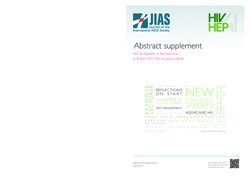Please use this identifier to cite or link to this item:
http://cris.unibe.edu.do/handle/123456789/67| DC Field | Value | Language |
|---|---|---|
| dc.contributor.author | Paulino-Ramírez, Robert | - |
| dc.date.accessioned | 2021-05-01T22:27:25Z | - |
| dc.date.available | 2021-05-01T22:27:25Z | - |
| dc.date.issued | 2017 | - |
| dc.identifier.citation | Journal of the International AIDS Society, Vol. 20, Suppl. 2 (P034) | - |
| dc.identifier.uri | https://cris.unibe.edu.do/handle/123456789/67 | - |
| dc.description.abstract | Introduction and objectives: LGBT and Men who have sex with men (MSM) have reported high discrimination in the healthcare setting. This discrimination places them at high risk for HIV. Pre‐exposure prophylaxis (PrEP), an approach used in high HIV risk populations, is currently not available in the Dominican Republic. This study aimed to evaluate how HIV high‐risk patients perceive PrEP and the likelihood of healthcare providers to prescribe PrEP. To our knowledge, this is the first study to assess the acceptability of PrEP between HIV high risk patients and healthcare providers in the Dominican Republic. Methods: Convenience sampling and the snowball effect was used to recruit participants who were 18 yo or older, HIV‐positive and self‐identified as gay, bisexual, transgender, transsexual or MSM. Heterosexual, HIV‐positive and individuals under 18 yo were excluded. PrEP perception, the level of embarrassment and the likelihood of prescribing PrEP were measured using a Likert scale survey ranging from, 1 being “Most likely/embarrassed” to 5 being “Least likely/embarrassed.” A Chi‐square test compared PrEP interest between sexual orientations. Results: A total of 64 participants and 25 healthcare providers were interviewed. The sample of participants consisted of 17 gay men, 6 bisexual, 4 transvestites, 4 transsexuals, 21 transgenders and 12 MSM. No statistical difference was found between the groups and their PrEP interest, χ2 (4, N = 64) = 2.81, p = 0.59 (Table 1). As shown in Figure 1, more than 20% of gay, MSM, transgender and transsexual participants reported to not feel embarrassed to take PrEP. While less than 5% of all the participants reported to feel really embarrassed to take PrEP. As shown in Figure 2, 40% of the providers reported that they might prescribe PrEP if the patient demonstrates HIV risk, while 4% reported they would not prescribe PrEP at all. Conclusions and future directions: Negative stigma was not tied to the use of PrEP, meaning potential users would welcome the implementation of PrEP. Despite the small sample size of healthcare providers (n = 25), more than half would consider prescribing PrEP if a patient demonstrates high HIV risk. Gain in‐depth perception of the healthcare providers’ perception of PrEP. Interview other minority populations, such as Haitian immigrants or HIV+ individuals. | en |
| dc.language.iso | English | - |
| dc.relation.ispartof | Journal of International AIDS Society | - |
| dc.rights.uri | https://creativecommons.org/licenses/by/4.0/ | - |
| dc.subject | Ciencias de la Salud | - |
| dc.title | Assessing the acceptability of PrEP amongst HIV high‐risk patients and healthcare providers in the Dominican Republic [abstract] | en |
| dc.type | Conference Poster | - |
| dc.rights.license | This is an open access article under the terms of the Creative Commons Attribution License, which permits use, distribution and reproduction in any medium, provided the original work is properly cited. | - |
| dc.relation.conference | HIV & Hepatitis in the Americas, 6–8 April 2017, Rio de Janeiro, Brazil | - |
| dc.identifier.doi | 10.7448/IAS.20.3.21954 | - |
| dc.contributor.affiliation | Instituto de Medicina Tropical y Salud Global (IMTSAG) | - |
| dc.relation.issn | 1758-2652 | - |
| dc.description.volume | 20 (Suppl. 2) | - |
| dc.description.issue | P034 | - |
| dc.contributor.authors | González‐Díaz, J. | - |
| dc.contributor.authors | Arboleda, N. | - |
| dc.contributor.authors | Rodríguez Lauzurique, Rosa M. | - |
| dc.contributor.authors | Paulino-Ramírez, Robert | - |
| dc.contributor.authors | Horigian, V. | - |
| dc.typeofaccess | Open Access | - |
| item.openairetype | Conference Poster | - |
| item.grantfulltext | open | - |
| item.fulltext | Con texto completo | - |
| item.languageiso639-1 | English | - |
| item.openairecristype | http://purl.org/coar/resource_type/c_18cf | - |
| item.cerifentitytype | Publications | - |
| crisitem.author.dept | Instituto de Medicina Tropical y Salud Global (IMTSAG) | - |
| crisitem.author.parentorg | Universidad Iberoamericana (UNIBE) | - |
| Appears in Collections: | Publicaciones del IMTSAG-UNIBE Publicaciones indexadas en Scopus / Web of Science | |
Files in This Item:
| File | Description | Size | Format | |
|---|---|---|---|---|
| Abstract supplement HIV & Hepatitis in the Americas 6–8 April 2017.pdf | Full text [open access] full issue | 4.02 MB | Adobe PDF |  View/Open |
This item is licensed under a Creative Commons License

